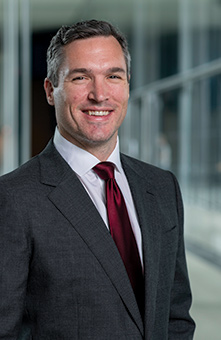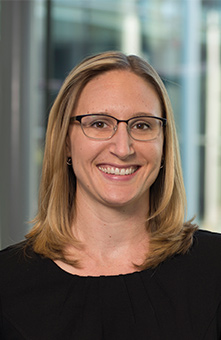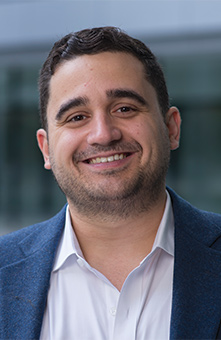Research in the Real World
Three recently arrived Yale SOM faculty members share a commitment to doing research that confronts real-world problems.
By Dana Cook Grossman
Bryan Kelly, Julia DiBenigno, and Tristan Botelho, all of whom joined the Yale SOM faculty in the last two years, have disparate research interests. Kelly studies mathematical questions in finance. DiBenigno has researched mental health care in the military. And Botelho examines factors that affect economic outcomes on digital platforms and for entrepreneurs. But they share a commitment to doing work that isn’t just theoretical.

“I’m an empiricist,” says Kelly, who recently published an important paper affirming work on excess volatility in asset pricing by Nobel Laureate Robert Shiller, Yale’s Sterling Professor of Economics. Kelly joined Yale SOM after eight years on the faculty at the University of Chicago Booth School of Business.
DiBenigno, who has been at Yale SOM for two years, since completing her doctorate at MIT Sloan School of Management, puts her approach to research this way: “One thing that drives me is making sure my work has real-world impact.”
And Botelho, who came to Yale SOM a year ago, also after completing his doctorate at MIT, says, “Publishing a new paper or having an idea is a lot of fun. But the most rewarding thing, I think, is having people use your knowledge, seeing it in action.” In some recent work, Botelho looks at how non-quantifiable factors—such as gender or social influence—affect the evaluation of quality even when objective indicators of performance are available.
Kelly, a professor of finance, says he is most interested in using mathematics to illuminate aspects of financial markets that investors face every day. “If I find new facts that are reliable and important for understanding the way the world works,” he says, “that’s what I find most fascinating.”
For example, a paper he co-authored with Yale SOM’s Stefano Giglio a year ago, published in the Quarterly Journal of Economics, explored the puzzle of excess volatility in asset pricing first described by Shiller. “A lot of people have written theories that make Shiller’s puzzle quote-unquote ‘not a puzzle anymore,’” Kelly says. But he and Giglio performed calculations suggesting that those theories don’t hold up in the real world. “The puzzle seems much deeper,” Kelly says. “There must be some additional source of price fluctuation, some additional erratic behavior, that’s not accounted for in these models.
“It was very rewarding to put that evidence together,” he adds. “It’s unambiguous and has a large and important effect.”
Kelly is also associate director of SOM’s International Center for Finance, where he’s helping chart an interdisciplinary approach to problems that use machine learning. “Yale has been a leader in this area,” he says. “They were one of the first universities to put together a data science department. Historically, computer science evolved as one field and statistics as another; data science merges the two. A university that’s open to recognizing that some fields evolve over time is, I think, a very forward-looking place.”

DiBenigno, an assistant professor of organizational behavior, takes “an inductive approach” to her research, embedding herself inside an organization and steeping herself in an actual problem. For her dissertation work, the problem was why soldiers were not benefiting from the extensive mental health services offered to them.
“Despite billions of dollars spent and dozens of well-intended initiatives,” she explains, “soldiers didn’t benefit from these services because, it turned out, their direct commanders didn’t support them using the services. So I focused on identifying organizational structures and practices that improved commander relations with their soldiers’ mental health providers. Once those relationships were strong and effective, soldiers actually used and benefited from the services.”
A paper that DiBenigno just finished builds on this work to examine the tactics mental health providers used to develop influential relationships with commanders. The theory developed has implications in other types of organizations for “what I call a peripheral expert, someone with expertise but without formal authority over line managers—say, a sustainability officer or diversity officer or safety manager. How does someone like that get people inside an organization to listen to them?”
She is drawn to questions like these that “span boundaries. My research embraces micro, meso, and macro levels and draws from concepts in psychology, sociology, and organizational behavior. Working in a business school gives me the best of all worlds,” she says, “in that it’s incredibly interdisciplinary.”
Botelho, like DiBenigno, is an assistant professor of organizational behavior; he is also a faculty affiliate of Yale SOM’s Program on Entrepreneurship. His research interests were sparked by his observation, while working in finance and strategy before starting his doctorate, of “how many other factors came into play even in seemingly objective situations.”

He tries to capture and analyze the effect of what he calls “social evaluations. I’m interested in how factors unrelated to quality can affect your evaluation of something or someone—your perception of its quality. In a paper last year, for example, we looked at gender. Specifically, do men and women with equal performance get treated equally by their peers?” In fact, he notes, the paper concluded that women are too often “penalized in terms of certain evaluation criteria.
“To me,” he adds, “to be a good business leader requires being well rounded. You have to not just drive the bottom line but do so in a responsible way—think about your workers, think about equality. Not only do I believe that my research helps in this end but also the questions that I study are important to me, personally.”
He is especially interested in such issues as they relate to digital platforms and entrepreneurial contexts—the former because “digital platforms are becoming an integral part of many firm and social processes,” and the latter because “entrepreneurship is powerful for the individual and the economy, and there is much we still do not understand.”



